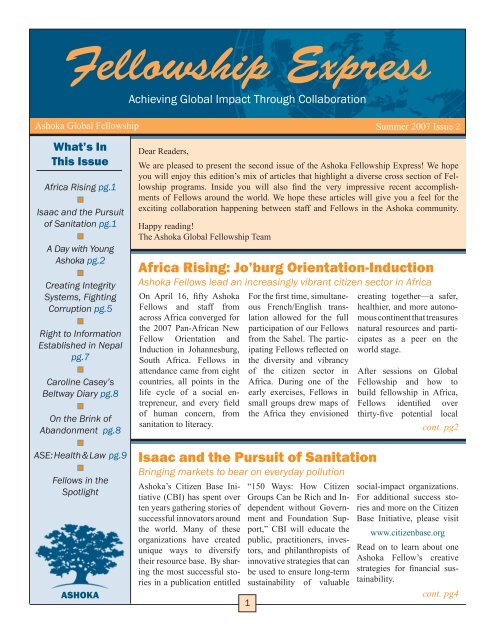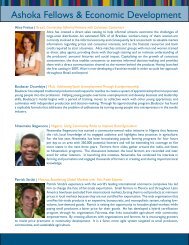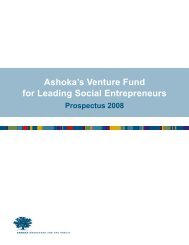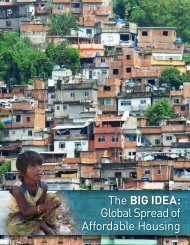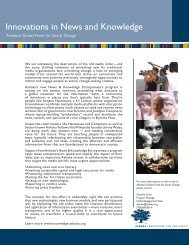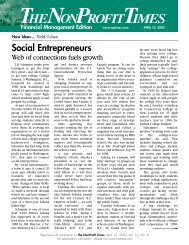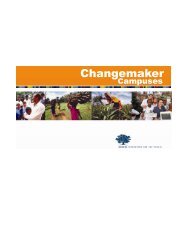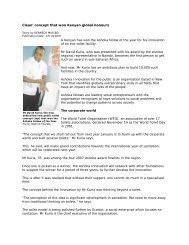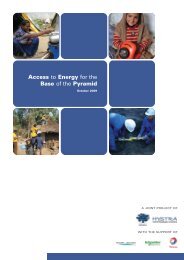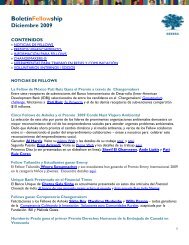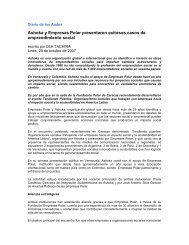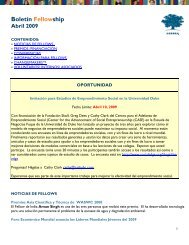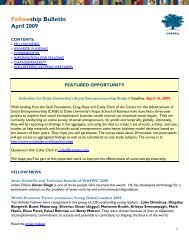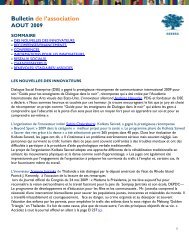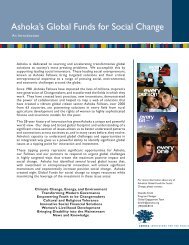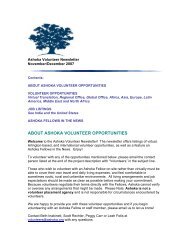cont. - Ashoka
cont. - Ashoka
cont. - Ashoka
Create successful ePaper yourself
Turn your PDF publications into a flip-book with our unique Google optimized e-Paper software.
Fellowship Express<br />
What’s In<br />
This Issue<br />
AshokA<br />
Achieving Global Impact Through Collaboration<br />
<strong>Ashoka</strong> Global Fellowship Summer 2007 Issue 2<br />
Africa Rising pg.1<br />
■<br />
Isaac and the Pursuit<br />
of Sanitation pg.1<br />
■<br />
A Day with Young<br />
<strong>Ashoka</strong> pg.2<br />
■<br />
Creating Integrity<br />
Systems, Fighting<br />
Corruption pg.5<br />
■<br />
Right to Information<br />
Established in Nepal<br />
pg.7<br />
■<br />
Caroline Casey’s<br />
Beltway Diary pg.8<br />
■<br />
On the Brink of<br />
Abandonment pg.8<br />
■<br />
ASE: Health & Law pg.9<br />
■<br />
Fellows in the<br />
Spotlight<br />
Dear Readers,<br />
We are pleased to present the second issue of the <strong>Ashoka</strong> Fellowship Express! We hope<br />
you will enjoy this edition’s mix of articles that highlight a diverse cross section of Fellowship<br />
programs. Inside you will also find the very impressive recent accomplishments<br />
of Fellows around the world. We hope these articles will give you a feel for the<br />
exciting collaboration happening between staff and Fellows in the <strong>Ashoka</strong> community.<br />
Happy reading!<br />
The <strong>Ashoka</strong> Global Fellowship Team<br />
Africa Rising: Jo’burg orientation-Induction<br />
<strong>Ashoka</strong> Fellows lead an increasingly vibrant citizen sector in Africa<br />
On April 16, fifty <strong>Ashoka</strong><br />
Fellows and staff from<br />
across Africa converged for<br />
the 2007 Pan-African New<br />
Fellow Orientation and<br />
Induction in Johannesburg,<br />
South Africa. Fellows in<br />
attendance came from eight<br />
countries, all points in the<br />
life cycle of a social entrepreneur,<br />
and every field<br />
of human concern, from<br />
sanitation to literacy.<br />
For the first time, simultaneous<br />
French/English trans-<br />
lation allowed for the full<br />
participation of our Fellows<br />
from the Sahel. The participating<br />
Fellows reflected on<br />
the diversity and vibrancy<br />
of the citizen sector in<br />
Africa. During one of the<br />
early exercises, Fellows in<br />
small groups drew maps of<br />
the Africa they envisioned<br />
Isaac and the Pursuit of sanitation<br />
Bringing markets to bear on everyday pollution<br />
<strong>Ashoka</strong>’s Citizen Base Initiative<br />
(CBI) has spent over<br />
ten years gathering stories of<br />
successful innovators around<br />
the world. Many of these<br />
organizations have created<br />
unique ways to diversify<br />
their resource base. By sharing<br />
the most successful stories<br />
in a publication entitled<br />
“150 Ways: How Citizen<br />
Groups Can be Rich and Independent<br />
without Government<br />
and Foundation Support,”<br />
CBI will educate the<br />
public, practitioners, investors,<br />
and philanthropists of<br />
innovative strategies that can<br />
be used to ensure long-term<br />
sustainability of valuable<br />
creating together—a safer,<br />
healthier, and more autonomous<br />
<strong>cont</strong>inent that treasures<br />
natural resources and participates<br />
as a peer on the<br />
world stage.<br />
After sessions on Global<br />
Fellowship and how to<br />
build fellowship in Africa,<br />
Fellows identified over<br />
thirty-five potential local<br />
<strong>cont</strong>. pg2<br />
social-impact organizations.<br />
For additional success stories<br />
and more on the Citizen<br />
Base Initiative, please visit<br />
www.citizenbase.org<br />
Read on to learn about one<br />
<strong>Ashoka</strong> Fellow’s creative<br />
strategies for financial sustainability.<br />
<strong>cont</strong>. pg4
Fellows in the<br />
spotlight:<br />
Prema Gopalan<br />
India<br />
SSP: Self Education for<br />
Development founder<br />
wins gender prize<br />
May 2007. Indian Fellow<br />
Prema Gopalan has<br />
been selected the 2007<br />
recipient of the Mary<br />
Fran Myers Gender and<br />
Disaster Award. Prema is<br />
recognized as an expert in<br />
community-driven, genderequitable<br />
disaster response<br />
and resilience initiatives.<br />
Lenin Raghuvanshi<br />
India<br />
Human rights advocate<br />
wins 007 Gwangju Prize<br />
and $50,000 honorarium<br />
May 2007. The 2007<br />
Gwangju Prize for Human<br />
Rights was awarded to<br />
Fellow Lenin Raghuvanshi<br />
for his work in northern<br />
India. Dr. Lenin leads the<br />
People’s Vigilance Committee<br />
on Human Rights<br />
which has over 50,000<br />
members working against<br />
caste discrimination and<br />
torture across five Indian<br />
states.<br />
A Day with Young <strong>Ashoka</strong><br />
An <strong>Ashoka</strong> Fellow adept<br />
at mobilizing funding for<br />
gender empowerment, Rita<br />
Thapa recently hosted a Nepal<br />
Young <strong>Ashoka</strong> event at<br />
her organization’s headquarters.<br />
Acting on the principle<br />
that Everyone is a Changemaker,<br />
the program offered<br />
a space for Fellows’ kids to<br />
share their experiences as<br />
children of social entrepreneurs<br />
and to gain exposure<br />
to <strong>Ashoka</strong> and Fellows.<br />
Young <strong>Ashoka</strong> Program<br />
Young <strong>Ashoka</strong> aims to encourage<br />
and enable a new<br />
generation of social entrepreneurs.<br />
It strengthens<br />
<strong>Ashoka</strong> as a caring community<br />
and an effective lifelong<br />
network for Fellows<br />
and their children.<br />
<strong>Ashoka</strong> Nepal Representative<br />
Sadhana Shrestha and<br />
Nepali Fellow Vinaya Kasajoo<br />
facilitated the session,<br />
which was attended by eighteen<br />
Young <strong>Ashoka</strong>ns. After<br />
introducing the mission of<br />
Thapa’s organization, called<br />
TEWA, Rita’s daughter Riva<br />
spoke about the importance<br />
of philanthropy and public<br />
service in modern Nepal.<br />
Connecting those principles<br />
with ways in which young<br />
people can be involved in<br />
society, she motivated the<br />
children to enter the field<br />
themselves.<br />
Riva shared her own experience<br />
as a child of a social<br />
entrepreneur. It was hard for<br />
her to cope with her mother’s<br />
extended business-related<br />
absences, though she gradually<br />
came to understand the<br />
value of her mother’s work<br />
and draw inspiration from it.<br />
Vinaya Kasajoo, a Fellow<br />
who trains barefoot journalists,<br />
then taught the children<br />
principles of writing stories,<br />
both fiction and non-fiction,<br />
to spark what he calls<br />
“logical creative thinking.”<br />
To reach out to the visual<br />
learners, he connected these<br />
stories with pictures and illustrations<br />
and showed how<br />
each portion enhances the<br />
value of the other.<br />
Africa Rising: Jo’burg o-I (<strong>cont</strong>.)<br />
and regional collaborations.<br />
Patrick Gathitu and Adrian<br />
Mukhebi, for example, want<br />
to connect their agricultural<br />
improvement projects in<br />
Kenya. Agatha Chukweuke<br />
wants to extend her Nigerian<br />
support and advocacy network<br />
for service industry<br />
employees to Uganda and<br />
South Africa, where Maria<br />
Baryamujura and Noel<br />
de Villers work. Rachel<br />
Mamoss (Kenya) wants<br />
to help Nkem Momah in<br />
Nigeria to add a disability<br />
component to his emergency<br />
health care services.<br />
One of the most popular<br />
sessions was on Fellow<br />
Security, led by global<br />
fellowship director Samjhana<br />
Upadhyay, where she<br />
The children then divided<br />
into groups and selected<br />
pictures that they had to<br />
formulate into stories. Enthusiastic,<br />
they produced<br />
creative pieces that Vinaya<br />
is compiling and publishing<br />
as a children’s book.<br />
At the end of the day Sadhana<br />
briefed the participants<br />
on the importance of networking<br />
with other Young<br />
<strong>Ashoka</strong> members. Aiding<br />
this is the new website www.<br />
ashokitos.org, launched by<br />
members Abhinav and Dipankar<br />
Kasajoo. It is a platform<br />
to share with, learn<br />
about and engage other<br />
Young <strong>Ashoka</strong> members.<br />
Members were then given<br />
their first task as a group. To<br />
encourage true engagement<br />
in their communities, they<br />
each received a fundraising<br />
box from TEWA. In three<br />
months they will reconvene<br />
and hold a formal event<br />
pooling all the money each<br />
child has raised and donate<br />
it to TEWA. ■<br />
addressed the three levels<br />
of threat and appropriate<br />
responses for each. The<br />
many African Fellows<br />
working in environments<br />
of severe corruption sought<br />
to make security a higher<br />
priority in future meetings.<br />
This session followed<br />
from a Fellow Security<br />
Consultation in Dakar in<br />
early July where 15 Fellows<br />
<strong>cont</strong>. pg3
Africa Rising: Jo’burg o-I (<strong>cont</strong>.)<br />
and staff members from<br />
the region met and built a<br />
cohesive strategy for Fellow<br />
Security focused in Africa.<br />
The other popular program<br />
was a Fellow Visit to two<br />
Senior Fellows’ workplaces,<br />
which exposed new Fellows<br />
to projects that successfully<br />
scaled. Veronica Khosa,<br />
elected in 2000, started<br />
Tateni Home Care Nursing<br />
Services for HIV/AIDS<br />
patients, a model that the<br />
South African government<br />
has adopted in more<br />
than fifty places. Mandla<br />
Mentoor, elected in 2002,<br />
enables township youth to<br />
clean up their communities,<br />
changing garbage heaps into<br />
what he calls Mountains of<br />
Hope. Having converted one<br />
of Soweto’s eyesores into a<br />
thriving community center,<br />
he is now spreading this<br />
model to other townships.<br />
Many of the inductee<br />
Fellows were inspired by<br />
both Veronica and Mandla.<br />
“Many <strong>Ashoka</strong> Fellows work<br />
alone,” said Dennis Sonkoi,<br />
“but with <strong>Ashoka</strong> we get that<br />
motivation, that support of<br />
being in a family.”<br />
Quotes from Fellows<br />
<strong>Ashoka</strong> is like an engine,<br />
it propels our ideas.<br />
- Adrian Mukhebi, Kenya<br />
Tailored to the African<br />
<strong>cont</strong>ext were workshops<br />
on ethics by South African<br />
Fellow Douglas Racionzer<br />
and regional representative<br />
Chimene Chetty and on<br />
fundraising and resource<br />
mobilization sessions by<br />
CBI Director Geralda<br />
Wildschutt and CBI Investee<br />
Roche van Wyk.<br />
Other highlights included<br />
sessions on scaling up<br />
organizations by Olivier<br />
Kayser and engaging the<br />
business sector by Lisa<br />
Nitze, <strong>Ashoka</strong> Vice-<br />
Presidents in London and<br />
Washington. Fellows then<br />
practiced at a Business-Social<br />
Bridge Breakfast Roundtable<br />
with representatives from<br />
Danone, Woolworth’s retail<br />
chain, investment banks, and<br />
<strong>Ashoka</strong> Fellows and staff in Johannesburg for the<br />
2007 Pan-African Induction<br />
the citizen sector. Resulting<br />
fundraising and partnership<br />
opportunities have already<br />
set the groundwork for the<br />
<strong>Ashoka</strong> Support Network<br />
in Africa and for African<br />
Roadshows in the US and<br />
Europe in 2008. Local and<br />
national media coverage of<br />
the Orientation/Induction<br />
enhanced this, landing<br />
<strong>Ashoka</strong> on allafrica.com and<br />
on South African radio.<br />
Fellows showcased their<br />
achievements to the one<br />
hundred thirty attendees of<br />
the Pan-African Induction<br />
event held at an historic<br />
downtown Johannesburg<br />
hotel. Regional representatives<br />
and veteran<br />
Fellows welcomed their new<br />
peers with warm words and<br />
embraces. Participants spoke<br />
to <strong>Ashoka</strong>’s value on the<br />
<strong>cont</strong>inent. Newly elected<br />
Kenya Fellow Dennis Sonkoi<br />
said, “when you are working<br />
in your little corner, <strong>Ashoka</strong><br />
brings you out and lets you<br />
see how many people think<br />
your idea is good, how you<br />
are respected and recognized<br />
and validations of what ideas<br />
you work on.”<br />
Special thanks go to the<br />
Southern Africa regional<br />
team for hosting its guests<br />
brilliantly. As the hope for<br />
Africa grows, <strong>Ashoka</strong> will<br />
be growing right along with<br />
it—with social entrepreneurs<br />
leading the way. ■<br />
Fellows in the<br />
spotlight:<br />
orri Vigfusson<br />
Global<br />
<strong>Ashoka</strong> Global Fellow wins<br />
the presigious Goldman<br />
Environmental Prize<br />
April 2007. Orri’s innovative<br />
approach and unwavering<br />
commitment to reverse<br />
the near-extinction of wild<br />
North Atlantic salmon<br />
recently earned him the<br />
$125,000 Goldman prize. It<br />
is awarded annually to six<br />
environmental heroes and<br />
is the largest award of its<br />
kind in the world.<br />
Mercedes De Freitas<br />
Venezuela<br />
Transparencia Venezuela<br />
wins the $5,000 Changemakers<br />
competition,<br />
Ending Corruption:<br />
Honesty Instituted<br />
June 2007. Three <strong>Ashoka</strong><br />
Fellows’ programs were<br />
selected finalists in the<br />
most recent Changemakers<br />
competition. Merchy’s,<br />
one of three winners,<br />
enables citizen groups to<br />
openly evaluate their local<br />
governments in an effort to<br />
prevent corruption.
<strong>Ashoka</strong> Fellow:<br />
Isaac Durojaiye<br />
aka Otunba Gadaffi<br />
• Studied graphic<br />
design and business<br />
administration,<br />
but ended up in the<br />
security business<br />
• Worked for years<br />
as the Chief of<br />
Security for an<br />
American Express<br />
executive<br />
• Hired to provide<br />
security at a large<br />
wedding, he recognized<br />
that the<br />
toilet facilities at<br />
the venue would<br />
constitute a security<br />
threat<br />
• Suggested and proceeded<br />
to construct<br />
18 toilets inside<br />
three <strong>cont</strong>ainers.<br />
In his own words,<br />
“this worked<br />
perfectly well,”<br />
giving rise to DMT<br />
Mobile Toilets<br />
Isaac and the Pursuit of sanitation (<strong>cont</strong>.)<br />
Concerned about the health<br />
and environmental issues<br />
created by the absence of<br />
public toilets in most Nigerian<br />
cities, <strong>Ashoka</strong> Fellow Isaac<br />
Durojaiye launched the<br />
country’s first portable toilet<br />
initiative. In Nigeria, most<br />
public places have no toilet<br />
facilities, worsening the<br />
already heavily polluted<br />
waterways, rivers and seas.<br />
As many Nigerians rely<br />
directly on unfiltered water<br />
for cooking, drinking and<br />
washing, <strong>cont</strong>amination only<br />
adds to the spread of infectious<br />
diseases such as dysentery<br />
and cholera. Contaminated<br />
drinking water and unsanitary<br />
waste disposal are closely<br />
associated with diarrheal<br />
diseases, the second biggest<br />
cause of childhood death in<br />
Nigeria.<br />
DMT Mobile Toilets locally<br />
manufactures toilets and then<br />
leases them to community<br />
members, who charge a<br />
small fee for their use.<br />
Employing primarily jobless<br />
youth to run and maintain the<br />
toilets, DMT allows a oncedisenfranchised<br />
part of the<br />
community to reintegrate and<br />
earn income.<br />
By providing toilets, DMT<br />
promotes a healthier environment:<br />
it simultaneously<br />
educates the community<br />
about proper waste disposal<br />
and provides a viable alternative<br />
to streetside waste<br />
practices. DMT’s system<br />
results in a healthier, more<br />
dignified environment<br />
throughout Nigeria while<br />
creating hundreds of jobs.<br />
Recently profiled in the New<br />
York Times and by the BBC<br />
Network, Durojaiye was<br />
also selected as the Schwab<br />
Foundation’s Social Entre-<br />
preneur of the Year in<br />
Nigeria in 2005.<br />
Citizen Base Strategy<br />
Put the boys to work. DMT<br />
made a bold decision to hire<br />
idle street youth, popularly<br />
known as Area Boys, to<br />
manage its public toilets. By<br />
giving youth an opportunity<br />
to make money—workers<br />
earn income by charging a<br />
$0.02 USD fee for toilet use<br />
and giving a percentage to<br />
DMT—young people gain<br />
a sense of ownership and a<br />
stake in keeping the toilets<br />
clean and functional. A<br />
typical day’s proceeds<br />
amount to roughly US$15,<br />
a wage well above Nigeria’s<br />
average income. The<br />
partnership ensures that the<br />
street youth not only earn<br />
decent salaries, but also gain<br />
meaningful work experience<br />
and join in broader society.<br />
Target high-volume needs<br />
for high profits. DMT covers<br />
93% of organizational costs<br />
by income from events<br />
How We Have Changed Nigeria: DMT Mobile Toilets’ Own Perspective<br />
Sector Effect Impact<br />
health<br />
economic<br />
empowerment<br />
Introduced a sustainable, innovative solution for improving environmental<br />
sanitation and public health<br />
Created a national consciousness about Mobile Public Toilets<br />
Enhanced convenience when attending major events<br />
Empowered youth and women with the Neighbourhood Mobile<br />
Public Toilet Scheme (PAY-AS-YOU-SHIT)<br />
Create job opportunities in waste management<br />
Pioneered Nigeria’s human waste management industry<br />
Demonstrated that there are practical ways for Nigerian youth to<br />
reintegrate into greater society<br />
Proved that with passion, focus and determination, you can<br />
achieve your dream<br />
Proved that the smallest idea can become a goldmine<br />
There is nothing to be ashamed of in turning “shit business into<br />
serious business.”
and sales of their goods and services. For<br />
example, it both rents and sells its toilets<br />
to companies at premium prices. Cross-<br />
subsidizing operations, the organization is<br />
then able to place toilets in heavily used<br />
public spaces. DMT also receives income<br />
for providing services at major events,<br />
such as The 8th All African Games and the<br />
Commonwealth Heads of Government<br />
Meeting in Abuja. It supplements its income<br />
through stall advertisement sales while<br />
trying to keep costs low by working directly<br />
with sanitary product manufacturers.<br />
Adapt imports for local production. Local<br />
production both empowers the community<br />
and reduces organizational costs. Originally,<br />
DMT manufactured its own wagon toilets,<br />
basically wooden outhouses. In 1999, DMT<br />
imported 30 portable plastic toilets from<br />
the UK, toilets that were both lighter and<br />
easier to clean. To reach the long-term goal of<br />
producing toilets locally, the company<br />
acquired the necessary knowledge and technology<br />
to begin manufacturing high-quality<br />
plastic toilets on its own. This eliminated<br />
the costs of purchasing and shipment,<br />
created local jobs, and eliminated<br />
dependence on external resources.<br />
Lessons Learned<br />
Encourage ownership. Part of the reason<br />
DMT’s model works so well is that each<br />
toilet is “owned” by a community member<br />
– a young person motivated to maintain and<br />
care for the product in order to <strong>cont</strong>inue<br />
earning a livelihood.<br />
Hire locally. To ensure a steady supply of<br />
mobile toilets, Durojaiye established a local<br />
factory to manufacture the toilets where he<br />
trained and hired exclusively local employees.<br />
This increased employment, decreased<br />
costs and made the organization more independent.<br />
Be open to feedback. Women from the<br />
local community once remarked to DMT<br />
that the majority of those leasing the toilets<br />
were men, leaving women out of the cycle<br />
of prosperity. DMT therefore began working<br />
with various states’ Ministries of Women’s<br />
Affairs. To increase employment and<br />
alleviate poverty among women, it gave<br />
them toilets in strategic locations to maintain.<br />
The organization also founded DETOWES<br />
(Descent Toilets for Schools and Women<br />
Empowerment Scheme), a social service<br />
arm that empowers women and provides<br />
free toilets for schools in order to promote<br />
better health and hygiene. ■<br />
Celebrating the government’s donation of latrines<br />
Creating Integrity systems, Fighting Corruption<br />
On May 24, twelve <strong>Ashoka</strong> staff and<br />
Fellows from across Latin America<br />
gathered in Lima, Peru, to find new<br />
approaches to fighting corruption. The<br />
consultation occurred as a follow-up to<br />
July’s Changemaker’s competition on<br />
“Ending Corruption: Honesty Instituted”.<br />
Fellows addressed key questions on the<br />
issue of corruption (see side bar, page six)<br />
and shared their unique approaches. <strong>Ashoka</strong><br />
staff introduced <strong>Ashoka</strong>’s Law For All<br />
Initiative (LFAI) to show them how LFAI<br />
provides legal guidance and resources to<br />
Fellows. This gathering in Lima was the first<br />
in a sequence of consultations to occur on<br />
5<br />
<strong>cont</strong>. pg6<br />
DMT Results<br />
Impact to date:<br />
• Since 2003, DMT<br />
has manufactured<br />
1,500 toilets<br />
• At the 8th All African<br />
Games, DMT<br />
provided and managed<br />
over 300 mobile<br />
toilets<br />
• The Nigerian government<br />
recently<br />
donated 2,000 free<br />
toilets to DMT<br />
• DMT plans to<br />
expand to 13 other<br />
cities in Nigeria<br />
• DMT is working to<br />
devise creative avenues<br />
for the future,<br />
including recycling<br />
waste to generate<br />
bio-gas, electricity<br />
and fertilizer for<br />
farmers<br />
• DMT has <strong>cont</strong>ributed<br />
tremendously to a<br />
cleaner environment<br />
and improved sanitation<br />
in major cities in<br />
Nigeria<br />
• Others listed at<br />
dmttoilets.com
Questions on<br />
the Table<br />
Here are examples<br />
of questions that set<br />
the groundwork for<br />
the consultation:<br />
• What <strong>cont</strong>ributions<br />
can social entrepreneurs<br />
make to fight<br />
corruption?<br />
• Are there barriers or<br />
approaches specific<br />
to the Latin American<br />
<strong>cont</strong>ext?<br />
• Which are the<br />
current networks<br />
that are working<br />
on corruption and<br />
transparency? What<br />
is their scope?<br />
• Do social entrepreneurs<br />
need to<br />
interface with those<br />
networks?<br />
• Is it necessary that<br />
socially entrepreneurial<br />
initiatives<br />
transform into<br />
public policy? Why<br />
or why not?<br />
• What are the risks<br />
and challenges of<br />
taking that leap?<br />
• How would we<br />
transform Fellows’<br />
innovations and<br />
strategies into a<br />
public policy?<br />
• What changes are<br />
needed to push<br />
Fellows’ models to<br />
their full potential?<br />
Creating Integrity systems (<strong>cont</strong>.)<br />
corruption. The next will be<br />
held with Fellows in Asia in<br />
the fall of 2007.<br />
Highlights and Outcomes<br />
of Consultation<br />
To spotlight the most effective<br />
practices used by experts<br />
in the field, each Fellow<br />
presented his or her unique<br />
approach to fighting corruption.<br />
Methods presented<br />
included programs aimed at<br />
developing citizen groups<br />
that monitor corruption at<br />
the local level, increasing<br />
governmental transparency<br />
and citizen access to information,<br />
and mobilizing youth<br />
to play a more active role in<br />
their local government.<br />
Expanded Definition<br />
of Corruption<br />
Corruption is not only the<br />
embezzlement or misuse<br />
of public funds or resources,<br />
but any action taken<br />
by a government official<br />
that is not in the best interests<br />
of the people they<br />
represent.<br />
While each Fellow employs<br />
his or her own method, it<br />
was apparent that the focal<br />
point of each approach was<br />
catalyzing citizen involvement<br />
and participation, putting<br />
citizens back in <strong>cont</strong>rol.<br />
Taking stock of their many<br />
approaches to fighting<br />
corruption, Fellows then<br />
identified critical areas to<br />
engage citizens. Individuals<br />
need to develop a sense of<br />
ownership of the state, its<br />
<strong>Ashoka</strong> Fellows and staff gathered in Lima, Peru for<br />
the Global Fellowship / Changemakers<br />
anti-corruption collaboration<br />
resources and their representatives.<br />
As one Fellow put it,<br />
“No one would let you come<br />
into their house and steal<br />
from them, but because it<br />
belongs to the State, no one<br />
does anything.”<br />
Changing the public’s<br />
perceptions and attitudes<br />
towards its government<br />
is crucial for marshaling<br />
citizen participation. Apathy,<br />
cynicism and fear can cripple<br />
even the most open systems.<br />
The group identified several<br />
key areas in which a shift in<br />
popular public attitude could<br />
have significant impact.<br />
Other key components to<br />
achieving effective citizen<br />
<strong>cont</strong>rol include:<br />
• Recognizing, promoting<br />
and helping honest<br />
leaders, institutions and<br />
citizens.<br />
• Developing systems to<br />
enable better inter- and<br />
intra-sector collaboration.<br />
• Effectively using the<br />
justice system and other<br />
mechanisms to denounce<br />
and punish corruption.<br />
Fellows also developed a<br />
regional mosaic of solutions<br />
for corruption based on<br />
the online discussions on<br />
Changemakers.net and on<br />
the fruitful collaboration in<br />
Lima. While this collaboration<br />
was only the start of<br />
a long and complicated<br />
Redefinition of Government Responsibilities<br />
Governments, and more importantly government<br />
officials, have a duty to their constituency. They<br />
have a responsibility to put the best interests of the<br />
public first and foremost, whether they are voting on<br />
new legislation or negotiating <strong>cont</strong>racts with private<br />
industry. They are the primary watchdogs.
discourse, the group did adjourn with<br />
several clearly defined goals:<br />
• To create a basic anti-corruption and<br />
freedom of information course for Fellows<br />
working in other sectors.<br />
• To <strong>cont</strong>inue the dialogue and develop<br />
additional cross-sector best practices to<br />
fighting corruption while engaging other<br />
Changemakers in Asia and Africa.<br />
• To launch the Law For All Initiative in<br />
South America.<br />
The group was also joined by Ruchika Bahl,<br />
the Director of <strong>Ashoka</strong>’s Law for All Initiative<br />
in Asia and Gaston Wright, who leads<br />
<strong>Ashoka</strong> Group Entrepreneurship programs.<br />
LFAI supports human rights defenders, facilitates<br />
pro bono legal assistance, and fos-<br />
Right to Information Established in Nepal<br />
The revised Nepalese Right<br />
to Information Bill was<br />
unanimously passed by the<br />
country’s interim parliament<br />
on July 13, 2007. Its earliest<br />
drafts had many loopholes,<br />
spurring Law for All<br />
Director Ruchika Bahl<br />
and country representative<br />
Sadhana Shrestha to start<br />
a national debate on its<br />
provisions.<br />
Taking input from <strong>Ashoka</strong><br />
Fellow Mandira Sharma,<br />
they invited Indian Fellow<br />
Arvind Kejriwal to Nepal to<br />
share his experiences with<br />
Right to Information issues<br />
and local governance.<br />
Ruchika and Arvind met with<br />
many <strong>Ashoka</strong> Fellows, key<br />
CSOs, advocates, lawyers,<br />
and journalists. Arvind<br />
shared his perspectives on<br />
India’s RTIA, potential<br />
amendments to the draft of<br />
the Nepali bill, and thoughts<br />
on how they would affect<br />
citizens.<br />
Nepal Fellow Rajendra<br />
Dahal used a national newspaper’s<br />
full page interview<br />
with Arvind as a springboard<br />
to engage other CSOs and<br />
parliamentarians, organizing<br />
a working session with them.<br />
It stressed a few critical<br />
clauses needed for an<br />
effective RTI Act outlined<br />
by Arvind.<br />
1. Penalty clause: There<br />
should be compulsory<br />
penalty for an officer who<br />
fails to provide information<br />
within prescribed time or<br />
provides false, misleading,<br />
incomplete or irrelevant<br />
information.<br />
Ana Teresa Bernal at the consultation<br />
ters access to justice. The initiative was<br />
launched in India in December 2003 and has<br />
been active throughout Asia. Fellows immediately<br />
identified with its goals and saw<br />
its connection to their earlier work on corruption.<br />
As a result, LFAI will soon launch<br />
in South America. ■<br />
7<br />
2. Independent appellate<br />
body: An independent Information<br />
Commission should<br />
be set up where people who<br />
do not receive satisfactory<br />
information within the pres-<br />
cribed time can file appeals.<br />
Information Commissioners<br />
should have judicial backgrounds.<br />
3. Exclusion clause: Items<br />
excluded from RTIA should<br />
be as few as possible.<br />
In testament to the work of<br />
all of these <strong>Ashoka</strong> staff and<br />
Fellows, the bill that just<br />
passed in Nepal incorporated<br />
all three pieces of advice,<br />
finalizing this historic<br />
legislation.<br />
Congratulations to the Fellowship<br />
team in Asia for<br />
their successful role in making<br />
this legislation reality. ■<br />
Fellows in the<br />
spotlight:<br />
Victor Ananias<br />
Turkey<br />
Fellow honored by Turkey’s<br />
Today’s Zaman for<br />
ecological <strong>cont</strong>ributions<br />
May 2007. Victor created<br />
Bugday, an organization<br />
that has created the ecologically<br />
friendly agriculture<br />
movement in Turkey.<br />
Elected the country’s first<br />
<strong>Ashoka</strong> Fellow in 2000,<br />
after 15 years of work he<br />
has finally handed full <strong>cont</strong>rol<br />
of the organization over<br />
to its Board of Directors.<br />
John Mighton<br />
Canada<br />
Education reformer set to<br />
publish his second book<br />
on teaching methodology<br />
May 2007. Canadian Fellow<br />
John Mighton, now<br />
a mathematics PhD, challenged<br />
conventional math<br />
teaching with his first book,<br />
The Myth of Ability. Now,<br />
drawing on examples from<br />
JUMP Math, a resoundingly<br />
successful tutoring program<br />
he began in Toronto,<br />
he has published The End<br />
of Ignorance: Multiplying<br />
Our Human Ability.
Fellows in the<br />
spotlight:<br />
Ayyappa Masagi<br />
India<br />
Oustanding service to<br />
society and environment<br />
May 2007. The Essel<br />
Group and Zee Network<br />
recently honored Ayyappa<br />
Masagi with the Essel<br />
Karnataka’s Best Social<br />
Service Award. Ayyappa<br />
helps farmers learn and<br />
implement water management<br />
techniques, showing<br />
them how to collect and<br />
best use available rainfall.<br />
Apolonio Gomez<br />
Mexico<br />
Sexual health pioneer in<br />
Mexico heralded at premier<br />
Latino conference<br />
June 2007. Apolonio<br />
Gomez, an <strong>Ashoka</strong> Fellow<br />
from Mexico, was given<br />
the Hero of the Community<br />
award at Alianza 2007, the<br />
largest Spanish-language<br />
Latino conference in the<br />
US. He created the country’s<br />
first primarily mobile<br />
HIV/AIDS information<br />
center, bringing education<br />
and <strong>cont</strong>raceptives to areas<br />
without traditional access.<br />
Roshaneh Zafar<br />
Pakistan<br />
International recognition<br />
for financial transparency<br />
June 2007. Roshaneh<br />
Zafar, founder of the Kashf<br />
Foundation, a microfinance<br />
organization for women in<br />
Pakistan, received a Merit<br />
Award from the Consultative<br />
Group to Assist the<br />
Poor, international certification<br />
approving of her<br />
organization’s <strong>cont</strong>ribution<br />
to financial and accounting<br />
transparency.<br />
Caroline Casey’s Beltway Diary<br />
Persevering as a social entrepreneur<br />
Irish Fellow Caroline Casey,<br />
who was selected in 2006<br />
for her work improving the<br />
employment prospects for<br />
the disabled in Ireland,<br />
made a trip through the<br />
United States this spring<br />
as an Eisenhower Fellow.<br />
During that time she wrote<br />
The Beltway Diary, a weekly<br />
column for The Irish Times,<br />
from which these two pieces<br />
are excerpted.<br />
There is something incredibly<br />
arrogant about believing you<br />
have to be listened to, about<br />
getting up after being kicked<br />
down, and fighting blindly<br />
to get what you want, but I<br />
would rather call it passion...<br />
In 1992, the government<br />
of Balochistan (a state in<br />
Pakistan) asked me to<br />
promote girls education in<br />
the rural areas of the state<br />
where no schools for girls<br />
existed. My approach involved<br />
organizing community<br />
educators and identifying<br />
potential teachers––women<br />
with an eighth grade<br />
education. Site visits to rural<br />
communities were routine.<br />
But this time it was<br />
different: the community in<br />
Balochistan was complex,<br />
and I had to leave my newly<br />
married son and his bride.<br />
In my culture it is a very<br />
important occasion when a<br />
new daughter-in-law joins<br />
the family, and it was my<br />
responsibility to make the<br />
bride feel comfortable and<br />
It seems to drive creativity.<br />
This passion is reliant on<br />
moments of success. It is<br />
what we live for. We are<br />
addicted to those moments<br />
when we shift a person’s<br />
point of view, bag a fabulous<br />
funder, watch a vision<br />
become reality, but mostly<br />
when we experience<br />
the wonder of unexpected<br />
opportunity.<br />
My first day in New York is<br />
a perfect example. At 10am I<br />
find myself sitting in front of<br />
a senior partner and global<br />
managing director in Ogilvy.<br />
I can hardly believe my<br />
luck as my half-hour meet-<br />
on the Brink of Abandonment<br />
A story from Fellow Quratulain Bakhteari<br />
settled in as part of the<br />
family. But I had a commitment<br />
to the government<br />
of Balochistan, so I left for<br />
Panjgoor district.<br />
Officers in the district’s<br />
Department of Education,<br />
I discovered, were cold<br />
and uncooperative. They<br />
were not interested in promoting<br />
girls education and<br />
had not helped identify any<br />
potential teachers. After<br />
three days of meetings, for<br />
the first time in my life I<br />
grew very unhappy and<br />
frustrated with work. I could<br />
not get through to the local<br />
government officials. I began<br />
to miss the happiness<br />
and warmth of my family,<br />
wishing I was home<br />
celebrating the marriage of<br />
my son.<br />
ing rolls into a two-hour<br />
discussion about how an<br />
idea I have been nursing for<br />
some time around media and<br />
disability could become a<br />
reality. I have come to this<br />
advertising guru and, right<br />
across the table from me,<br />
this man gets it! And, what’s<br />
more, he asks me back!<br />
On the third night, as I lay<br />
in the heat and dust under<br />
a dark sky with few stars,<br />
I thought of my family and<br />
children, my son looking so<br />
handsome with his lovely<br />
wife, the room I decorated<br />
for her but could not see<br />
her enjoy. As I lay there, I<br />
decided to leave this village<br />
and project and go home the<br />
next day.<br />
Suddenly, I heard a young,<br />
cheerful female voice<br />
calling me by my name<br />
and using the title of “Baji”<br />
which means “elder sister”.<br />
“Qurat Baji, Qurat Baji,<br />
is it you?” said the voice<br />
from the darkness. I was<br />
completely shocked. “Who<br />
are you my child?” I asked.<br />
The young woman lifted<br />
<strong>cont</strong>. pg10
Later that evening I am<br />
eating a green curry with<br />
The Eisenhower<br />
Fellowship<br />
EF gives its participants<br />
professional insights and<br />
<strong>cont</strong>acts, a broadened<br />
international and crosscultural<br />
perspective, and<br />
a lifelong network of<br />
colleagues and friends.<br />
Its purpose reflects the<br />
conviction that greater<br />
understanding among individuals<br />
fosters greater<br />
understanding among<br />
nations and <strong>cont</strong>ributes<br />
to peace and progress<br />
for all.<br />
Shirlene, an art entrepreneur<br />
from Singapore, and Chien-<br />
Chi Chang, a Magnum<br />
photographer from Taiwan.<br />
As I launch my diatribe<br />
about disability representation<br />
in the media and arts,<br />
Chien gently pushes his<br />
recent book across the table.<br />
It is called The Chain, and<br />
is a shocking testimony of<br />
life at the Lung Fa Tang<br />
mental asylum in Taiwan.<br />
He gets it!<br />
By the time we leave the restaurant,<br />
I have the support<br />
of someone I could not even<br />
have dared hope for.<br />
By the time I get back to<br />
the hotel, with the Manhattan<br />
lights twinkling outside<br />
Advocates for social Entrepreneurs<br />
ASE at the intersection of health and law<br />
The Advocates for Social<br />
Entrepreneurs (ASE) network<br />
is mobilizing a pro<br />
bono, voluntary legal network<br />
around the world. The<br />
program has supported nearly<br />
one hundred <strong>Ashoka</strong> Fellows<br />
through introductions<br />
to high-quality legal services.<br />
Together <strong>Ashoka</strong> Fellows,<br />
legal networks and law<br />
firms are strengthening the<br />
pro bono movement globally.<br />
Most recently, Edith Grynspancholc,<br />
a Fellow from<br />
Argentina who founded the<br />
Natali Dafne Flexer Foundation,<br />
expressed her interest<br />
to better understand laws regarding<br />
cancer treatment for<br />
children in Latin America<br />
countries. Her Foundation<br />
supports children suffering<br />
from malignant diseases<br />
(mainly childhood cancer)<br />
by helping their families obtain<br />
critical information, get<br />
the best available treatment,<br />
and improve their quality of<br />
life.<br />
In order to assist Edith, the<br />
<strong>Ashoka</strong> ASE team <strong>cont</strong>acted<br />
The Cyrus R. Vance Center<br />
for International Justice.<br />
Founded on the principle<br />
that lawyers have an important<br />
role to play in promoting<br />
social justice and strengthening<br />
democracy, The Vance<br />
Center works with organizations<br />
in democratic countries<br />
seeking to advance the role<br />
the legal profession plays in<br />
promoting access to justice.<br />
The Center also facilitates<br />
collaboration between public<br />
and public sectors in or-<br />
my window, I have to pinch<br />
myself. I may not have<br />
changed the world but I have<br />
seen the possibility of it.<br />
We do what we do because<br />
we know we can change<br />
things; because our belief<br />
and courage are fuelled by<br />
the entirely unexpected moments<br />
of chance, where serendipity<br />
throws you a line and<br />
an idea you have could very<br />
possibly become a reality.<br />
In the business of business,<br />
social change or just taking<br />
a risk, never forget: among<br />
the good, bad and ugly, the<br />
bloody marvelous exists too.<br />
And that, I have learnt, can<br />
come any time, any place.<br />
Just keep your eyes open. ■<br />
der to achieve meaningful<br />
access to justice and instill a<br />
genuine ethic of societal responsibility<br />
in the legal profession.<br />
By encouraging a global exchange<br />
of information and<br />
ideas that builds the capacity<br />
of members of the legal<br />
profession to affect positive<br />
change in their societies,<br />
The Vance Center immediately<br />
agreed to help Edith in<br />
this project.<br />
Now gaining the appropriate<br />
legal knowledge, she hopes<br />
to build partnerships with<br />
other leaders in the field to<br />
influence public policy and<br />
to ensure that laws related<br />
to childhood cancer are respected<br />
and implemented<br />
throughout Latin America. ■<br />
Fellows in the<br />
spotlight:<br />
Aaron Pereira<br />
Canada<br />
Social Investment Ventures<br />
Fellow named an<br />
Architect of the Future<br />
June 2007. Aaron Pereira is<br />
pioneering Canada’s only<br />
national financial institution<br />
dedicated to serving citizen<br />
sector organizations. It provides<br />
resources that CSOs<br />
currently lack: savings accounts,<br />
credit, investments,<br />
and financial advice. For<br />
this vision, he was awarded<br />
a full scholarship to attend<br />
the conference of the Waldzell<br />
Institute in September.<br />
Anshu Gupta<br />
India<br />
India Fellow wins grant to<br />
scale up in a global World<br />
Bank competition<br />
May 2007. Anshu’s organization,<br />
GOONJ, has built<br />
a nationwide movement to<br />
manage a massive transfer<br />
of used clothes, household<br />
goods, and other essential<br />
material items to India’s<br />
rural poor. For his work he<br />
was named a winner of the<br />
World Bank Development<br />
Marketplace competition.
A special<br />
Thanks To:<br />
Rachel Land<br />
Lanna Walsh<br />
Scott Rechler<br />
Bruno Borges<br />
Gaston Wright<br />
Carol Grodzins<br />
Ali Levine<br />
Jessica Lee<br />
Caroline Casey<br />
Sadhana Shrestha<br />
Samjhana Upadhyay<br />
Quratulain<br />
Bakhteari<br />
Dan Tuttle, Editor<br />
on the Brink of Abandonment (<strong>cont</strong>.)<br />
the lantern to her face. She was about 20<br />
years old and her eyes sparkled with deep<br />
excitement and love.<br />
Then she began to explain. She grew up in<br />
a town called Baladia, a town of squatter<br />
settlements I worked in during the early<br />
eighties to bring sanitation and hygiene<br />
education.<br />
“You came to my house and talked to my<br />
mother about sending me to school,” she<br />
said, “and it was after hours so I could still<br />
work and earn money for my family. You<br />
used to visit us a lot and gave us books.<br />
“Because of you I was able to go to school<br />
until the tenth grade.”<br />
Her name was Bano. She had followed her<br />
husband home to Panjgoor four years ago<br />
and is now a math teacher at the only school<br />
in town.<br />
Her hug sent a flow of warmth through my<br />
sad and frustrated body.<br />
To learn more about Global Fellowship and Fellows featured<br />
in this issue, go to ashoka.org.<br />
0<br />
Then I looked at her with excitement––I<br />
had found my first ally in the entire town!<br />
I asked her if she would help me to find<br />
villages where there were literate women to<br />
recruit to be teachers. She jumped at once<br />
and said “Oh yes, I will come tomorrow and<br />
I will take you to meet these women.”<br />
With Bano at my side I established 60<br />
girls schools in Panjgoor in one and a<br />
half months. It was an accomplishment<br />
I thought impossible upon my arrival.<br />
Now not only would girls have equal<br />
access to education, but the corrupt local<br />
officials would no longer be able to sell<br />
fake teaching posts and pocket the money<br />
for themselves.<br />
My encounter with Bano gave me the<br />
strength, vision, and motivation to<br />
<strong>cont</strong>inue doing my work. She was proof<br />
that I was helping to change lives. ■


